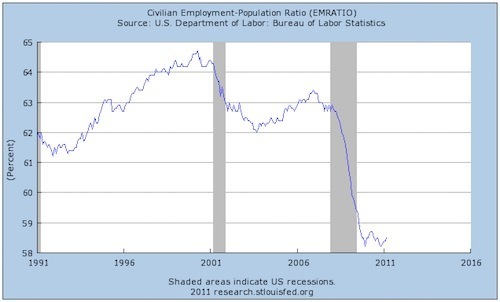Matthew Yglesias's Blog, page 2365
April 6, 2011
Isabel Sawhill on Paul Ryan's Budget Plan: Voodoo Economics Back in Full Gear

I met Brookings' Isabel Sawhill one time at a conference and she chided me for being insufficiently interested in cutting Social Security and Medicare spending. So I thought she might be into Paul Ryan's budget ideas, at least perhaps in a Jacob Weisberg contrarian kind of way. But not so much:
How should the President and other progressives respond? For starters, progressives should be unabashed in labeling the Ryan plan for what it is: an ideological manifesto for a Tea-Party-dominated Republican Party.
Here's what the progressive rebuttal should be in a nutshell: 1) point out that voodoo economics is back in full gear; 2) start talking about tax reform and its potential to produce a fairer, simpler, and more pro-growth system that has the added advantage of plugging a big hole in the budget; 3) instead of worrying about protections for the elderly, many of whom are quite affluent, remind people that, whether young or old, wealthy Americans have made out like bandits in recent decades and that it's time to do something for working families of modest means; 4) rethink America's defense posture and whether we can continue to be the world's policeman, and 5) be open to some reforms to Medicare and Medicaid but only if they're combined with additional revenues and a more streamlined military.
Personally, I would try to seize the bull of wealthy retirees by the horns. Let them keep all their Social Security benefits (it's better to give people money than health care) but add a deductible of X% of income to Medicare Part A, for some modest value of X while slightly reducing Part A copayments. That would have little to no impact on low income seniors, but a large impact on higher income ones. You could implement it more-or-less right away, it would preserve the sustainability of the system, and we could see what its impact is over time and continually re-evaluate. One of the big fallacies of the current construction of the issue, I think, is the idea that we need to write down on a piece of paper a single unequivocal "solution" rather rapidly implementing a handful ideas that might prove promising.


This Is Why We're Fat
Great infographic from Andrea Jezovit on the evolution of the American diet.
First, 1970:

Second, 2007:

If everyone ran an hour a day at eight miles per hour, that would actually make up for the increase, but obviously that's not what's happening.


Closing The Deficit By Creating Jobs
Employed people pay taxes and consume government services. Non-employed people pay much less in taxes, and consume more in public services. That's the key background as Felix Salmon has lunch with representatives from Loomis Sayles:
This year's lunch took place yesterday, and kicked off with Loomis vice chairman Dan Fuss coming up with a very interesting macroeconomic point. Right now, he said, about 56% of Americans over the age of 16 are gainfully employed. If that percentage were to rise to 64%, Fuss reckons, then the budget deficit disappears entirely.
This is, one should note, a perfectly attainable ratio:

In a sane world, Congress, the Fed, and the President would all be talking about their absolute determination not to halt macroeconomic expansion until we got back to that neighborhood.


SlapChop Guy Blazing New Trails in Harrassment
Anna North writes up an exciting new lawsuit in which Vince Shlomi, the SlapChop guy (or, as Jezebel would have it, the "ShamWow guy"), is sued by his former assistant who alleges he:
— He stalked her ex-boyfriend and watched her with binoculars.
— He offered to pay her to sleep in his bed.
— He also offered her $20,000 and a trip around the world for her eggs.
— He called her a "bitch" and a "cunt" because she "would not tell him the 'secret formula' that he claims existed for her to like him in a romantic manner."
— When she wouldn't show him a text he thought was from a man, he fired her.
Say what you will about the guy, but this egg-buying offer seems like that rarest of rarities—a genuinely novel form of sexual harassment.


Nancy Pelosi Vows To Party Like It's 2005 With Paul Ryan's Draconian Medicare-Ending Budget Proposal
On a conference call with bloggers just a bit earlier, Nancy Pelosi drew repeated and explicit parallels between Paul Ryan's GOP budget proposal and the 2005 Social Security fight. "We have to do something similar to what we did with Social Security," the House Minority Leader said "except we have to do it in real time."
She recalled of the 2005 battle that "[w]e took that as our opportunity to differentiate ourselves" and promises to do the same thing this time around. "When you look at who they're cutting taxes for and at the expense of whom, it's not a statement of our values," she said, and vowed to ensure that the American people would see it as the canonical statement of Republican values: "This is what they would do left to their own devices."


All Plans To Reduce Health Care Spending Will Bring About The Allegedly Dire Consequences of Single-Payer

There's plenty of fuzzy thinking on both sides around this subject, but Paul Ryan's budget has cystalized for me an important question—do conservatives want to reduce health care spending or don't they?
After all, if you ask a liberal true believer about health care policy and health care costs, they're likely to inform you that Medicare is much cheaper per capita than private insurance and that European single-payer systems are even cheaper than Medicare. The liberal true believer position is that if we had a more Europe-esque system and financed it with Europe-esque higher taxes then we'd all be better off. The smart conservative reply to this is to point out that though liberals like to tell themselves these European savings largely come out of the pockets of insurance executives and shareholders, that in fact it largely comes from the use of monopsony buying power as a kind of soft price control. To this a liberal may reply "so what?" you get universal coverage and lower prices. To that the smart conservative reply is supposed to be that reducing the prices you pay for health care services will reduce the pace of technological innovation in the health care sector. Liberals sometimes deliver a "more pie for everyone!" response to this that involves revolutionizing how we finance health care research (see, e.g., Dean Baker's patent ideas) but there's another branch this dialogue can take.
Specifically, all this bad stuff that conservatives say would result from a European-style system is a necessary consequence of any effort to reduce health care spending. If we cut Medicaid so that poor people need to reduce their consumption of health care services, this will reduce profits and therefore innovation in the health care sector. If we cut Medicare so that elderly people need to pay a higher share of their health care costs, this will presumably decrease their consumption of health care services and therefore profits and therefore innovation in the health care sector. Any effort to reduce health care spending necessarily has the consequence of decreasing the amount of private capital that flows into the health care sector. There may be reasons for thinking we should cut out all these public subsidies for health care consumption and establish a real free market in health care, but if that's what you want to do then "it will stifle innovation" can't be the reason you fear a "government takeover" of health care or the creation of a "European-style" system.


Paul Ryan's Nutty Point Forecast
Andrew Gelman brings an excellent statistical perspective to Paul Ryan's ridiculous contention that his plan will produce 2.8 percent unemployment.
Forget the macroeconomics and just think about the uncertainty—does Paul Ryan think that a 0.0 percent unemployment rate and a 5.6 percent unemployment rate are equally likely scenarios? Does he think a 6 percent unemployment rate and a negative unemployment rate are equally likely?


What If We Focused On The Long Term Climate Gap?

No matter how hard I try, I can't quite get my head around the combination of Washington's obsession with decades-away projected fiscal shortfalls and it's total lack of interest in decades-away projected climate disaster. If you asked me why the political prospects for addressing the climate crisis are so bleak, I'd say it's easy to understand. The worst effects of it are in the fairly distant future, the rich old people who run the country will be dead by then, etc. But at the same time, everyone's obsessed with the idea that Medicare will be too costly in 2070. It's considered both brave and serious to focus like a laser on the problem even while simultaneously insisting that it's politically unrealistic to propose any changes that take effect sooner than 2022. It's absolutely insane, and it's an important reminder of the significant ways in which the interests of powerful politicians drive the attention of policy wonks and journalists rather than the other way around.
But as a reminder:
— Cap and trade with auctioned permits will reduce the deficit and improve public health.
— Higher gasoline taxes will reduce the deficit and improve public health.
— Congestion pricing will reduce the deficit and boost economic growth.
— Curbing regulatory restrictions on density will boost economic growth.
Yes this is a "politically unrealistic" agenda, but why is that different from the widely praised "boldness" and "bravery" and "adult" nature of various deficit hawk concepts? Can't we get a commission? A grant from Pete Peterson? Something? It seems to me that a politician who wrote down a Ryan-style "Climate Roadmap" would find him or herself dismissed as a leftwing crackpot pushing wishful thinking rather than a bold thinker. It's infuriating.


April 3, 2011
Android Getting Less Open Sourcy

Having gained a staggering amount of market share with its open release of Android, Google now wants to exert some more control:
Playtime is over in Android Land. Over the last couple of months Google has reached out to the major carriers and device makers backing its mobile operating system with a message: There will be no more willy-nilly tweaks to the software. No more partnerships formed outside of Google's purview. From now on, companies hoping to receive early access to Google's most up-to-date software will need approval of their plans. And they will seek that approval from Andy Rubin, the head of Google's Android group.
This is the new reality described by about a dozen executives working at key companies in the Android ecosystem. Some of those affected include LG, Toshiba, Samsung, and even Facebook, which has been trying to develop an Android device. There have been enough run-ins to trigger complaints with the Justice Dept., according to a person familiar with the matter. The Google that once welcomed all comers to help get its mobile software off the ground has become far more discriminating—especially for companies that want to include Google services such as search and maps on their hardware. Google also gives chip and device makers that abide by its rules a head start in bringing Android products to market, according to the executives.
For those invested in the Apple side of the weird, quasi-ideological online debate about cell phones this is an opportunity for gloating but I think it's interesting to see the effort to put an influential piece of open source software into a business plan that's clearer than "we earn huge profits on web search so we have plenty of money to waste." After all, as I understand it what's been released is still open source software. If someone out there has the ability to do a better job than Google of updating existing Android OS, then the field is open to them. Google's leverage is its presumed expertise in doing updates to a product it created.


Kauffman Blogger Presentations
Most of the formal presentations from the economics bloggers conference I was over the weekend are available for viewing here. My favorites are Dean Baker on the inefficiency of patents, Arnold Kling dancing and discussing the economics of The Diamond Age, and Megan McArdle making me panic about anti-biotic resistant bacteria:
I used to read things like Laurie Garrett's The Coming Plague and be very worried. Then I kind of stopped thinking about it. But per McArdle's presentation, the multi-resistant bacteria problem remains quite real and the mismatched incentives that drive it seem incredibly difficult to pull apart, especially on a global basis.


Matthew Yglesias's Blog
- Matthew Yglesias's profile
- 72 followers



